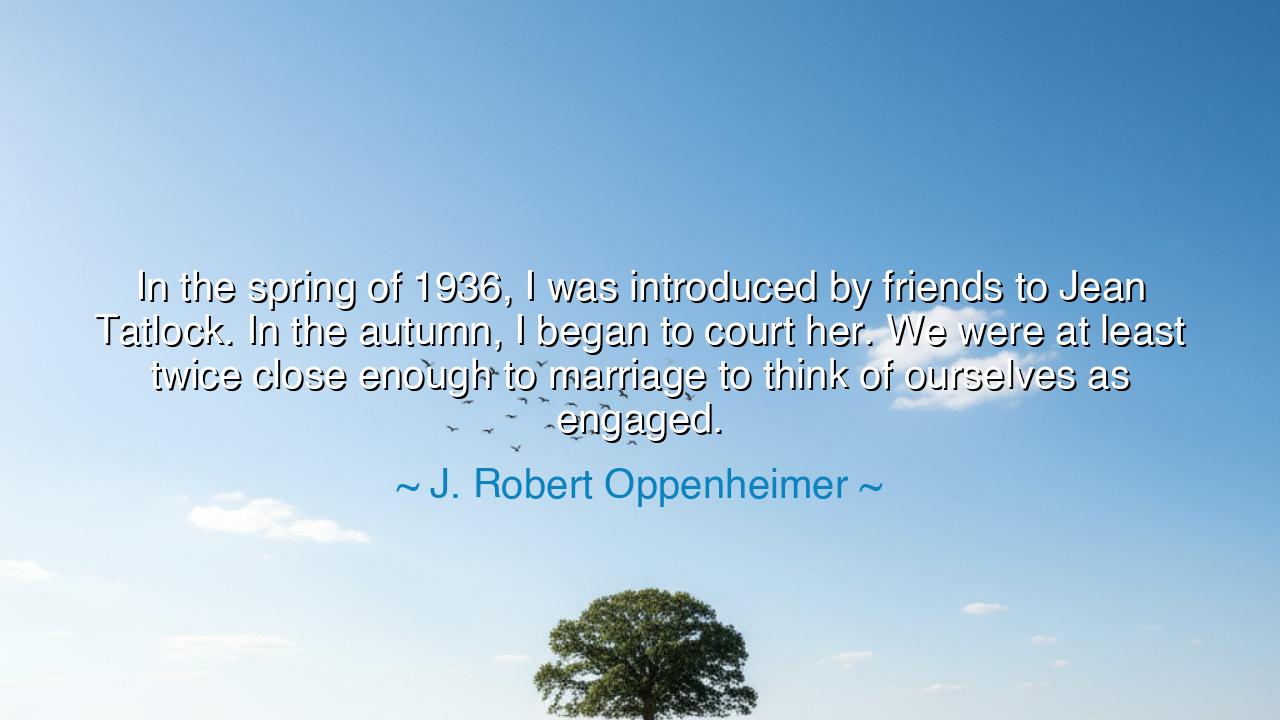
In the spring of 1936, I was introduced by friends to Jean
In the spring of 1936, I was introduced by friends to Jean Tatlock. In the autumn, I began to court her. We were at least twice close enough to marriage to think of ourselves as engaged.






When J. Robert Oppenheimer wrote, “In the spring of 1936, I was introduced by friends to Jean Tatlock. In the autumn, I began to court her. We were at least twice close enough to marriage to think of ourselves as engaged,” he was not merely recalling a love affair — he was revealing a fragment of the human soul behind the father of the atomic bomb. In these simple, restrained words lies a quiet ache, the weight of what was felt yet never fulfilled, and the ghost of tenderness that lingers even in the lives of those destined for greatness. His tone is that of reflection, not passion — as though he is writing not to rekindle the past, but to confess to history that even the men who shape the fate of nations are powerless before the mysteries of love and regret.
The origin of this quote lies in Oppenheimer’s recollection of his relationship with Jean Tatlock, a brilliant psychiatrist and a member of the Communist Party — a woman whose intellect matched his own, and whose spirit stirred something in him that equations and theories never could. Their love was marked by the turbulence of the age: the 1930s, a time of ideological storms, war on the horizon, and moral uncertainty. Oppenheimer, already on the path toward scientific immortality, found in Tatlock not only affection but a mirror to his own divided soul — her passion for justice, her melancholy, her longing for meaning in a fractured world. But love between them, though deep, was unsteady, pulled apart by the currents of politics, philosophy, and destiny.
In his words, there is no melodrama, no overt sentiment — only the haunting restraint of a man accustomed to measuring the immeasurable. Yet beneath that restraint lies profound emotion. When he says they were “close enough to marriage to think of ourselves as engaged,” we sense the tragic near-miss, the love that came to the threshold but could not enter. It is a truth as old as time: that not all who love deeply are meant to remain together, and not all who part do so from lack of affection. Their union was not destroyed by indifference, but by circumstance — the very forces that shape history sometimes crush the hearts of those who make it.
Jean Tatlock’s own story deepens the tragedy. She was a woman ahead of her time — brilliant, sensitive, politically aware, and yet burdened by inner darkness. Her death by suicide in 1944 struck Oppenheimer like a shadow that never left him. Some have said that she was the great unhealed wound of his life. He carried her memory into the years of the Manhattan Project, when he led the creation of a weapon that would change the world forever. When the first atomic bomb detonated in the desert of New Mexico, some say his silence afterward was not only the weight of science realized, but the echo of every loss, every moral fracture, every piece of humanity that had slipped through his hands — Jean among them.
There is an ancient symmetry to Oppenheimer’s story. Like the heroes of myth, he was a man who touched the divine fire, who harnessed the forces of creation and destruction — but in doing so, lost something of his own soul. His recollection of Jean Tatlock is a rare glimpse into that soul, unguarded and human. In the language of the ancients, this was not mere romance, but a bond of fate — a meeting of two minds destined to change one another and then drift apart, each carrying part of the other’s essence into eternity. It is the old lesson of love and loss: that some connections burn too brightly to last, yet they leave behind light that never truly fades.
The meaning of this quote reaches beyond Oppenheimer’s personal story. It reminds us that even the most brilliant minds cannot master the forces of the heart. Knowledge can split atoms, but it cannot mend longing. Power can move mountains, but it cannot undo regret. In his reflection, Oppenheimer shows the humility of a man who, for all his genius, recognizes that the soul does not obey the laws of physics. The very precision that defined his work was useless against the chaotic tenderness of human love. His memory of Jean is thus both confession and offering — a testament to the truth that love, even when it fails, remains the most meaningful experiment of all.
And so, let this story be passed down as a lesson: that love and ambition are both forms of creation, and both demand sacrifice. The wise will not seek to control the outcomes of the heart, but to honor the moments it gives — even those that end in silence. From Oppenheimer’s quiet remembrance of Jean Tatlock, we learn that greatness without empathy is hollow, and that even in a life devoted to science, it is love that gives meaning to discovery. Let us therefore live with tenderness amid our pursuits, remembering always that the world is not moved only by intellect or invention, but by the unseen, unmeasurable power of the human heart — fragile, flawed, and eternal.






AAdministratorAdministrator
Welcome, honored guests. Please leave a comment, we will respond soon